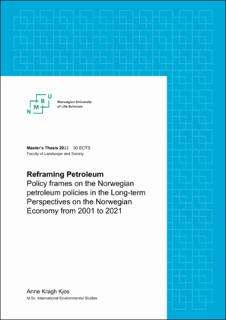| dc.description.abstract | With the indisputable significance of the petroleum industry and the Norwegian petroleum policies’ on the high share of government revenues, industrial activity, and public welfare, the oil revenues are the winning argument when environmental advocates call for reduced activity on the Norwegian continental shelf. The economic arguments are however being increasingly challenged. Questions have been raised of the economic risks of continued production, and the dependency of the Norwegian economy on one industry that may steadily, or rapidly, loose its significance in the coming decades. In addition, economic and policy analysis are advocating a shift from demand side measures in climate policies, to supply side climate policies, and the restrictions on production of fossil fuels.
Considering Norway’s continued efforts to maintain high activity on the NCS and claim its title as an international climate pioneer, and the growing uncertainties of the future of the petroleum industry in a changing climate, it is important to analyse the way this paradox is framed. The objective of this thesis was to identify the policy frames on the Norwegian petroleum policies employed in the Long-term Perspective Norwegian Economy from 2001 to 2021, and how these frames have diachronically changed.
Analysing a sample of six Long-term Perspective Norwegian Economy from 2001 to 2021, I identified nine frames: the ‘growth, welfare, and synergies’ frame; the ‘gas is the better fossil fuel’ frame; the ‘un-extracted resources’ frame; the ‘common good’ frame, the ‘competences of the petroleum industry’ frame, the ‘world needs oil’ frame, the ‘future generations’ frame, the ‘lack of competitive alternatives’ frame; and the ‘environmentally friendly extraction’ frame.
The findings show that the economic and environmental critiques have been incorporated into the already existing frames and led to reframing’s of the of the economic and environmental frames on the need for continued high extraction rates and meeting the demand for gas and oil, and the economic framings of the stability and flexibility of the Norwegian economic and fiscal policies. As such, the frames have been defending the policy position to stabilize the credibility of the framings in the light of the ‘crisis’ of climate policies. | en_US |

